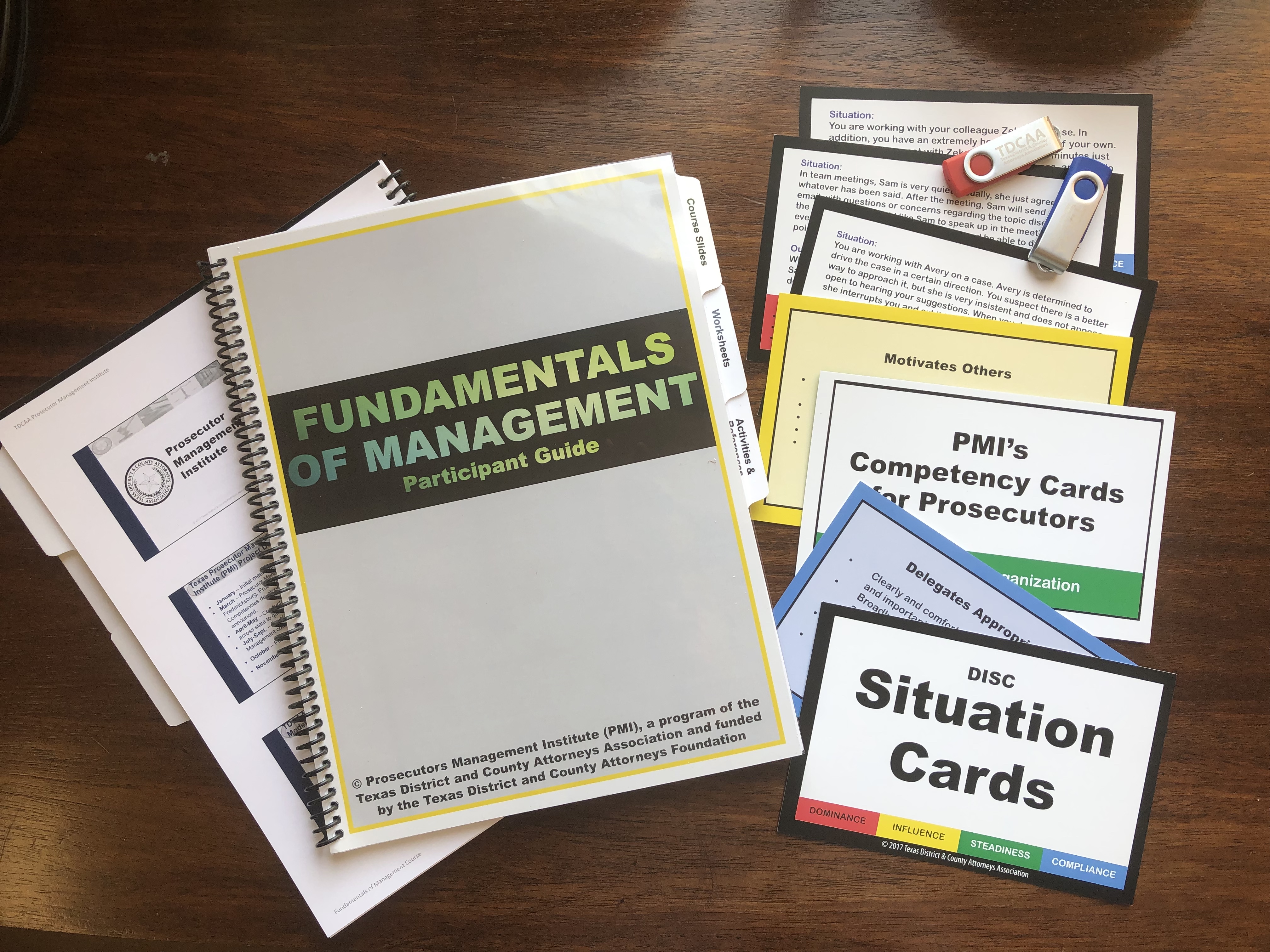When a presidential candidate wins 242 of 254 Texas counties, the message is clear, isn’t it? That said, we’ll skip a review of federal election results and focus on the state-level races of most impact to prosecutors here.
Prosecutor election results
There were nine contested prosecutor races in Texas this general election cycle. Here are the results, listed alphabetically by county:
Bell CA: Incumbent Jim Nichols (R) defeated Michelle Cummings (D).
34th DA (El Paso/Culberson/Hudspeth): James Montoya (D) defeated incumbent Bill Hicks (R).
Grayson CDA: John Kermit Hill (R) defeated Brandy Douglas (D).
Harris CA: Incumbent Christian Menefee (D) narrowly defeated Jacqueline Smith (R).
Harris DA: Sean Teare (D) narrowly defeated Dan Simons (R).
105th DA (Nueces): Incumbent Jimmy Granberry (R) defeated Terry Shamsie (D).
143rd DA (Reeves/Ward/Loving): Sarah Stogner (R) defeated incumbent Randy Reynolds (D).
53rd DA (Travis): Incumbent Jose Garza (D) defeated Daniel Betts (R).
Williamson CA: Incumbent Dee Hobbs (R) defeated Amy Lyn Lefkowitz (D).
All told, we count 59 (!!) newly elected prosecutors taking office in January, including three prosecutors who got appointed earlier this year to fill an unexpired term. If any of those newly-elected officials are in your county or are your neighbor, please let them know about our Elected Prosecutor Conference in The Woodlands. The conference includes a Newly Elected Prosecutor Boot Camp that starts on December 3, 2024. (All details are at the link provided.)
Statewide and other results
The political wildfire that swept through the Texas GOP primaries in March burned right on through the general election ballot this week as well. Let’s look at some highlights.
Judicial races
Stop us if you’ve heard this one before: Republican. Sweep.
Not only did GOP candidates easily win all six statewide races for the CCA and SCOTX, but Republican candidates won 25 of the 26 contested appellate court races throughout the state (although some of those were close and may be subject to a recount). Those appellate court candidates no doubt benefitted from a substantial infusion of conservative-sourced campaign funding that highlighted public safety and other law-and-order issues, even though those courts handle both criminal and civil issues and have little say in pretrial release or other hot button issues hammered home by those PACs.
Interestingly, Harris County courthouse races were also a mixed bag as Republican candidates retook some of the ground lost to the blue wave of previous election cycles in that county. This is relevant to future legislative discussions because of the outsized impact Harris County criminal justice policies can have on the rest of the state, including pretrial release practices.
Legislative races
The math here changed less than the vibes, but the vibe change could be significant.
In the Senate, Rs captured the lone competitive Senate seat and will have a 20-11 majority. But most of the attention is directed across the rotunda, where Republicans will control 87 of the 150 seats in the Texas House next session. That’s not much of a change in the overall math, but the many new faces could represent a significant change in who House Rs are going to support in their upcoming speaker race between current Speaker Dade Phelan (R-Beaumont) and challenger David Cook (R-Mansfield). Speaker Phelan has promised he has the necessary number of votes to maintain his leadership position, but he has yet to release the names of his supporters (which will likely include a large number of Democrats). Meanwhile, Rep. Cook still has at least 47 House Rs supporting his bid for the gavel after losing one supporter yesterday. This new class of 26 Republicans will be the largest Republican freshman class since 2013, and Governor Abbott claims he now has enough votes to pass a school voucher bill after helping defeat anti-voucher House members. How those new members will vote on the thousands of other bills presented to them next session remains to be seen.
National vibes
While elections in other states do not directly impact Texas prosecutors, it’s interesting to note how the Texas story fits into larger national narratives about crime and public safety.
For instance, California’s Prop 36 surfed the MAGA wave to victory. That ballot initiative increases penalties for drug and property crimes in that state, which had been lowered in 2014, and voters passed it overwhelmingly despite opposition from that state’s governor and other high-ranking politicians. In addition, two of the state’s most high-profile progressive prosecutors were relieved of their duties: Los Angeles DA George Gascon lost to a former federal prosecutor and Alameda County (Oakland) DA Pamela Price was recalled (along with Oakland’s mayor). Meanwhile, in Florida, two self-proclaimed reform prosecutors who had been suspended and later ousted by that state’s governor had mixed results in trying to reclaim their former jobs.
New TDCAA employees
If all of this change and uncertainty is confusing, imagine how it must feel for the guy we just hired to ride herd on this circus when it comes to town in January!
Hector Valle will be TDCAA’s new Director of Governmental Relations when he steps into the role being vacated by Shannon Edmonds, who is taking over as Executive Director in the new year after Rob Kepple retires. Hector worked as both a state and federal prosecutor in Dallas for more than a decade before moving to Austin to oversee the government relations and communications efforts of the General Land Office for eight years, followed by a stint as a partner in a strategic consulting firm. Hector is already on board getting up to speed in preparation for the next regular session in January, so be sure to look for him at next month’s Elected Prosecutor Conference and introduce yourself!
In addition, TDCAA has hired Kristin Burns, a seasoned prosecutor most recently with the Brazos County DA’s Office, to serve as TDCAA’s first Domestic Violence Resource Prosecutor. Kristin will develop training and support resources for family violence prosecutions in a manner similar to our Traffic Safety Resource Prosecutor program run by Clay Abbott.
Quotes of the Election
“Texans sent a clear message: they want safer streets, a secure border, a strong economy, and the economy to choose the best school for their children.”
—Gov. Greg Abbott (R), touting Republican gains during this election cycle.
“It’s a math question. Democrats try to make it a complex algebra problem, but it’s simple addition. There are still far more Republicans that vote in Texas than there are Democrats.”
—Matthew Langston, Republican political consultant, on the reason for yesterday’s election results.
“We will see no moderation from Republicans. They have got a mandate to do more or less as they wish.”
—Brandon Rottinghaus, U of H political scientist, in that same article.
“With the national environment the way it currently is, there is nothing we could have done to keep our seats this cycle.”
—Justice Meagan Hassan, a Democrat on Houston’s Fourteenth Court of Appeals, in a message to supporters on Facebook.
“I wouldn’t be surprised to see Ken Paxton running for U.S. senator against John Cornyn. I like John. He’s a nice man. I’m just saying Ken Paxton would be a really strong candidate for the U.S. Senate.”
—Lt. Gov. Dan Patrick (R), at a campaign event earlier this week.
###



